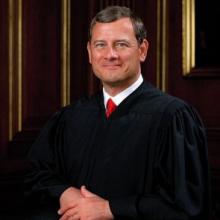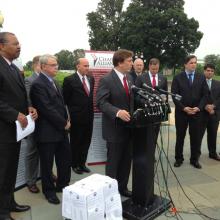religious liberty
Concerned that faith-based groups can discriminate in hiring while receiving federal funds, a coalition of 130 organizations told President Obama the policy will tarnish his legacy of fair and equal treatment for all Americans.
The critics, including religious organizations such as the Baptist Joint Committee for Religious Liberty and the Union for Reform Judaism, asked the president to direct Attorney General Loretta Lynch to review a “flawed” 2007 Justice Department memo that said the Religious Freedom Restoration Act provides for an override of nondiscrimination laws for government-funded religious organizations.
“RFRA was not intended to create blanket exemptions to laws that protect against discrimination,” says the letter sent to Obama Aug. 20 and announced by Americans United for Separation of Church and State.
Fighting to allow people to live by their religious convictions, even if those convictions are unpopular or criticized, is a battle Jeb Bush believes the next president must lead.
The former Florida governor and GOP presidential candidate pledged to defend religious liberty in front of an estimated 13,000 evangelical pastors attending a massive Southern Baptist Convention event Aug. 4 at Bridgestone Arena in Nashville.

Wake Forest Divinity School professor Rev. James Dunn. Photo via Ken Bennett / Wake Forest University School of Divinity / RNS
The Rev. James M. Dunn, a religious liberty advocate who worked the corridors of Washington power for two decades to defend the separation of church and state, died on July 4.
He was 83, and died of a heart attack at his Winston-Salem, N.C., home, said Cherilyn Crowe, spokeswoman for the Baptist Joint Committee for Religious Liberty.
After retiring from leading the committee in 1999, Dunn taught at Wake Forest University’s divinity school in Winston-Salem, serving as a professor of Christianity and public policy until 2014.
A teenage blogger from Singapore has been found guilty of insulting Christians and of distributing an obscene image of the country’s founding father, Lee Kuan Yew, and former British Prime Minister Margaret Thatcher.
Amos Yee, 16, had faced three years in prison, but will be put on probation instead, the Associated Press reported.
He was released on a bail of 10,000 Singapore dollars ($7,400).
Canada’s Supreme Court has ruled that a small town in Quebec may not open its council meetings with prayer.
In a unanimous ruling April 15, Canada’s highest court ruled that the town of Saguenay can no longer publicly recite a Catholic prayer because it infringes on freedom of conscience and religion.
The case dates back to 2007, when a resident of Saguenay complained about public prayer at City Hall.
Just last year, a divided U.S. Supreme Court ruled that legislative bodies such as city councils could begin their meetings with prayer, even if it plainly favors a specific religion.
But the Canadian high court ruled that the country’s social mores have “given rise to a concept of neutrality according to which the state must not interfere in religion and beliefs. The state must instead remain neutral in this regard. This neutrality requires that the state neither favor nor hinder any particular belief, and the same holds true for non belief.”
The court said a nondenominational prayer is still religious in nature and would exclude nonbelievers.
Less than two weeks after a third-grade teacher in Duncan, Okla., distributed Gideon Bibles to her students, the Church of Ahriman, a Satanist church in Oklahoma City, has asked permission to distribute Satanist literature at Woodrow Wilson Elementary School.
Adam Daniels, the church’s leader, said he wanted to give students a copy of Ahrimani Enlightenment, a primer and workbook normally given to new members of the church.
In a letter to the Duncan school district, some 80 miles south of Oklahoma City, Daniels assured administrators that his book is “no where (sic) near as graphic as the Christian Bible.”
Daniels said he has yet to hear back, but he believes equal access laws mean that his church has the right to distribute literature if other religious organizations are permitted to do so.
Sunlight slants across a classroom at the Catholic University of Lyon, where the Bible dominates an evening lecture.
The subject may not seem surprising in this ancient city that was once a bastion of French Catholicism and a hub for Christian missionaries. But the dozen or so people jotting notes are not theology students.
One young woman wears a headscarf. A man sports the beard of a devout Muslim. Still others are non-Muslim civil servants working for the local government.
All are enrolled in a program on the French concept of secularism and religious tolerance that is jointly run by two Lyon universities and the city’s Grand Mosque. They’re the unlikely foot soldiers of a national campaign for “Islam a la Francaise.”
The drive has taken on new urgency since January’s terrorist attacks in Paris and the departure of hundreds of French youths to join jihadist movements in the Middle East.
The country’s leftist government has responded with a raft of new measures to fight homegrown extremism.
A host of governors, CEOs, and church leaders call Indiana’s new religious freedom law a backdoor opening to anti-gay discrimination, but Americans appear more divided on whether a wedding-related business should have the right to turn away a gay customer.
The law, which critics say would allow owners of small businesses to invoke their faith to refuse service to LGBT customers, applies most apparently to wedding vendors — bakers, photographers, and florists, for example — who cite their faith in opposing same-sex marriage.
Where is the American public on this debate? It depends on how the question is asked.
A February Associated Press poll found that 57 percent of Americans believe a wedding-related business should have the right to refuse service to a gay couple on religious grounds, as opposed to nearly 4 in 10 Americans (39 percent) who said that religious exemption — which Indiana’s new law explicitly allows — is wrong.
1. How Yemen Became the Middle East’s Latest Regional Nightmare
As Saudi Arabia and Egypt say they’re prepared to send in ground troops, here’s a look at how Yemen got to this point.
2. God and Jeb
“[Jeb] Bush wants Christian conservatives to pay attention to what he's done, not just to what he says. But in a Republican presidential primary, can actions — much less actions more than a decade in the past — actually speak louder than words? Can quiet faith, and quiet support from some religious leaders, carry the day against a field full of outspoken Christian warriors?”
3. A Response to Critics of the Open Letter to Franklin Graham
“Jesus says ‘If another member of the church sins against you, go and point out the fault when the two of you are alone.’ Jesus does not say, ‘If another member of the church sins against millions, and hundreds of thousands begin to follow his lead on the issue, go and point out the fault when the two of you are alone.’”
4. Women & Leadership: Public Says Women Are Equally Qualified, but Barriers Exist
And it might not be the barriers you would think. “Only about one-in-five say women’s family responsibilities are a major reason there aren’t more females in top leadership positions in business and politics. Instead, topping the list of reasons, about four-in-ten Americans point to a double standard for women seeking to climb to the highest levels of either politics or business, where they have to do more than their male counterparts to prove themselves. Similar shares say the electorate and corporate America are just not ready to put more women in top leadership positions.”
The Senate has confirmed Rabbi David Saperstein as the State Department’s ambassador-at-large for international religious freedom, making him the first non-Christian to hold the job.
Saperstein, who led the Reform Jewish movement’s Washington office for 40 years, focusing on social justice and religious freedom issues, was nominated by President Obama in July and confirmed by a 62-35 vote on Dec. 12.
Saperstein takes a liberal bent on domestic issues, and all but one of the votes against him came from a Republican.
“Religious freedom faces daunting and alarming challenges worldwide,” Saperstein said at his confirmation hearing in September. “If confirmed, I will do everything within my abilities and influence to engage every sector of the State Department and the rest of the U.S. government to integrate religious freedom into our nation’s statecraft and foreign policies.”
Saperstein, named the most influential rabbi in America by Newsweek magazine in 2009, will head the State Department’s Office of International Religious Freedom, where he will be tasked with monitoring religious freedom abuses around the world.
In some ways, the case of the Muslim prisoner who wants to grow a beard seems easy. When it comes to a prisoner’s religious rights, federal laws favors accommodation when possible.
So how could Gregory Holt — known as Abdul Maalik Muhammad after his conversion to Islam — possibly lose at the Supreme Court, where the justices heard his case on Oct. 7?
Holt wants to grow a mere half-inch beard — a length of whisker allowed in the vast majority of state prison systems, but not the one where he is incarcerated: Arkansas.
Even Chief Justice John Roberts wondered how such a seemingly straightforward case came before the high court, which usually occupies itself with the thorniest of legal questions.
A Chicago woman has launched an online petition asking El Al Airlines to allot a section of its planes to ultra-Orthodox Jewish men who do not want to sit next to women.
Sharon Shapiro initiated the petition on Sept. 28, after two instances when several ultra-Orthodox men flying on Israel’s national carrier refused to sit in their assigned seats, which adjoined a seat occupied by a woman. The flights were delayed after female passengers refused to relinquish their assigned seats and the ultra-Orthodox men refused to sit down.
Incidents like these have been going on for years, according to women’s rights advocates.
Gender segregation is a core precept in ultra-Orthodox society, which believes that contact between unrelated men and women is strictly forbidden by Jewish law.
In Israel, attempts by some ultra-Orthodox men to impose gender segregation in public spaces such as offices, public buses and even streets in certain neighborhoods have prompted legal action by groups opposed to what they view as religious coercion.
It’s not every day that a coalition of legal minds is rooting for a violent inmate convicted of stabbing his girlfriend in the neck.
When Gregory Holt’s case arrives at the U.S. Supreme Court on Oct. 7, lawyers won’t be arguing about what landed him a life sentence in an Arkansas state prison, but rather what he wanted to do once he got there: grow a beard in observance of his Muslim religious beliefs.
The state of Arkansas says he can’t. Holt — a convert to Islam who now calls himself Abdul Maalik Muhammad — says he would keep his beard no longer than half an inch. But prison officials, backed by the state’s attorney general, argue that even such a short beard poses security risks.
“When it comes to making prison policies, the stakes are high; lives can be lost if the wrong decision is made,” according to the state’s legal brief, which describes Holt as a violent self-declared fundamentalist. “The ADC takes religious freedom seriously, but it takes seriously its paramount interests in safety and security, too.”
The St. Louis-based 8th U.S. Circuit Court of Appeals agreed with Ray Hobbs, the director of the Arkansas Department of Correction. But it’s hard to find too many others who think that the prison’s case for security trumps Holt’s right to exercise his religion.
At Beijing’s oldest Roman Catholic Church on Wednesday, Mary Zhang, 54, eagerly awaited the arrival of Pope Francis—at cruising altitude.
“I’m very excited. It’s the first time the pope has flown over China,” said Zhang, a regular worshipper at the Cathedral of the Immaculate Conception who volunteered to help clean the church.
“I really hope he can give a Mass in person in China one day. It’s a sign of a better relationship between the Vatican and Beijing, as flying over China was not allowed before.”
The pontiff, who landed in Seoul on Thursday for a five-day visit to South Korea, sent a telegram of greetings to Chinese President Xi Jinping as the papal plane flew over northeastern China, as Francis does with any country he flies over, in accordance with Vatican protocol.
The telegram, sent early Thursday, read, “Upon entering Chinese airspace, I extend best wishes to your excellency and your fellow citizens, and I invoke the divine blessings of peace and well-being upon the nation,” The Associated Press reported.
Popes have globe-trotted for decades, but none has visited China, a communist nation that crushed religion during Chairman Mao Zedong’s time. Today, China is more open but remains a “Country of Particular Concern,” according to the U.S. State Department’s latest International Religious Freedom Report, which last month described the continued harassment and detention of some Catholic clergy in China.
It is an identical claim to moral superiority which matters and which is in fact the cause of the apparent conflict. The underlying issues, whatever you think they may be, whether religious freedom, women’s reproductive rights, creeping restrictions on abortion or loosening of civil rights protections—all these issues are things we can talk about and solve together through discussion and compromise. ...Unless we begin from a position that says, "We refuse to talk with you or compromise."
AS THE U.S. mobilized for World War I, a wave of patriotic fervor and xenophobia swept the country. Anything German was suspect, and those who were German-speaking and refused to fight against Germany were doubly suspect. Resentment and anger were directed at Anabaptist groups; several churches were burned and pastors beaten.
Inevitably, the demands of the state conflicted with the rights of conscience. Christian pacifists who only desired to be true to their beliefs by not serving in the military faced a militarized state that saw them as disloyal and disobedient. There was no legally recognized right to conscientious objection—if drafted, the only alternative for objectors was to go into the military and then refuse to participate.
Hutterite leaders had agreed that their young men would register, but if drafted and required to report for military service, their cooperation would end. They would refuse any orders making them complicit in war. Pacifists in Chains is the story of four young men—David, Michael, and Joseph Hofer, and Jacob Wipf—from the Hutterite colony in Alexandria, S.D., who faced that choice. Duane C.S. Stoltzfus, a professor at Goshen College in Indiana, was given access to previously unpublished letters from these men to their wives and families; the book is built around those letters.
Upon being drafted, the four reported in May 1918 and were sent to Fort Lewis, Wash. When they arrived, they immediately faced the test. Ordered to sign an “enlistment and assignment card” and line up as soldiers, they refused and were taken to the guardhouse. Following a brief court-martial, they were found guilty and sentenced to 20 years. Two weeks later, they were in chains and with armed guards on a train headed south to Alcatraz prison in the San Francisco Bay, then a military “disciplinary barracks.” Once there, they again refused to put on the uniform—in this case a military prison one—and were placed in solitary confinement in “the hole,” a basement dungeon. The cells seeped water and were infested with rats; the men were given bread and water to eat and subjected to beatings.
My flight home from Phoenix over the weekend got pushed back, so I wound up spending an extra night at an airport hotel. Also, I got an $8 food voucher from the airline. I decided to eat at the hotel.
The restaurant was located on the top floor of the hotel with a nice view of downtown. There was a small bar near the entrance. A handful of hotel visitors were enjoying complimentary drinks and watching the Olympics on a flat-screen television.
I was greeted at the door by Melody, a transplant from Erie, Pa., who doubles as a bartender and a server. When I mentioned that I had a food voucher, she offered condolences for my scrambled travel plans. She also offered me a free beer.
Glass of red ale in hand, I picked a table in a corner of the restaurant, ordered a spinach salad and went back to reading a book about the Rev. Martin Luther King, Jr. and the long struggle to get the country to live up to its ideal that everyone should be treated as an equal child of God.
I couldn’t help but think about my 10 days in Arizona watching the state legislature debate and ultimately pass a bill that would allow business owners and individuals to refuse service to anyone on grounds of religious freedom. The impetus was a New Mexico case involving a photographer who refused to take photos of a gay couple.
The bill was promoted as a religious liberty issue. Opponents pointed out that it was the definition of discrimination — people would be singled out for unequal treatment.
A Tennessee pastor’s dangerous spiritual practices made him a star of a reality TV series.
Now they may make him a religious liberty crusader.
Officials from the Tennessee Wildlife Resources Agency raided the Tabernacle Church of God in LaFollete last Thursday and seized 53 venomous snakes — including timber rattlesnakes, copperheads, and several exotic breeds.
They cited the Rev. Andrew Hamblin, the church’s pastor and co-star of the National Geographic series Snake Salvation, and plan to charge him with 53 count of violating a state ban on possessing venomous snakes at a court hearing on Friday. Each count carries a maximum sentence of one year in jail.
Republican lawmakers and conservative activists concerned that religious expression in the military is “under attack” are rallying behind a measure to provide greater protection for religious “actions and speech” in the armed forces.
The amendment, sponsored by Rep. John Fleming, R-La., would specify in the military spending bill that, “Except in cases of military necessity, the Armed Forces shall accommodate the beliefs, actions, and speech” of service members.
Previous spending bills protected the “beliefs” of service members and chaplains, but the 2014 National Defense Authorization Act would expand protections to include religious “actions and speech.”
Daily Show correspondent Samantha Bee's latest segment for the late-night comedy show took on the perception in some religious circles that Christians are the ones being targeted by the LGBT community. She sits down with pastor and Christian radio-show host Matt Slick to explore his fear of infringement of his religious liberty.
"At what point has your right to express yourself been infringed upon?" Bee asked in the interview.
Slick's response: "I don't know if it's going to happen, but I'm concerned about it. I have a radio show. I'm just concerned about any oppression that may come, that people might say, 'Matt, you can say that on the radio, that homosexuality is a sin.'"

















